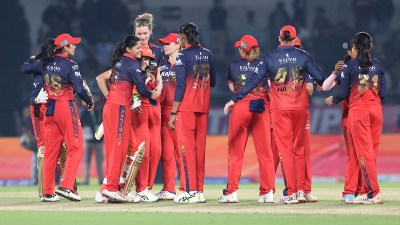Response not Modi-fied
The media implied that the BJP initially gave a lukewarm response to the Nanavati Commission report because it apprehended that the same com...

The media implied that the BJP initially gave a lukewarm response to the Nanavati Commission report because it apprehended that the same commission would soon indict Narendra Modi for the Gujarat riots. In fact, the BJP believes that Modi is on fairly 8216;safe8217; grounds as regards the Nanavati Commission8217;s findings on Gujarat. Sources say it8217;s unlikely that the Chief Minister would have been singled out in any particular incident in the affidavits. Even the official Congress affidavit does not directly refer to Modi8217;s role. When this lacuna was pointed out to Amarsinh Chaudhary, the late Gujarat Congress chief, he did nothing to rectify it.
Hardline on both sides
The renewed rebellion in the Gujarat BJP against Chief Minister Narendra Modi is being orchestrated largely by Pravin Togadia. The VHP leader is furious with the Modi administration for failing to protect him and allowing the Gujarat police to open up a large number of new cases in the Gujarat riots in which he and other VHP members are implicated. Togadia8217;s other grievance is that Modi maintained a diplomatic silence over Advani8217;s 8216;Jinnah is secular8217; statement. Actually Modi8217;s discretion on the Jinnah affair has stood him in good stead with the party chief giving no quarter to the Keshubhai Patel-led rebels.
It is hardly a coincidence that Togadia, Keshubhai Patel, and Gordhan Zadaphia, who refused to be sworn in as an MoS in Modi8217;s Cabinet, are all Patels.
Incidentally, the Congress leadership is furious with Shankarsinh Vaghela for calling on his old foe, Keshubhai Patel; the Congress strategy is that the Gujarat BJP should slog it out among themselves.
Young sons and others
Since the Congress has a very visible group of young and personable MPs, such as Rahul Gandhi, 33, Milan Deora, 28, Sachin Pilot, 28, Jiten Prasad, 31, and Jyotiraditya Scindia, 34, it is generally assumed that the party has more young blood that the BJP. The impression is reinforced when you consider that the UPA Chairperson, Sonia Gandhi, is only 58, while the Leader of the Opposition, L K Advani, is 77 and the leader of the NDA, Atal Behari Vajpayee, is 80. But television visuals don8217;t necessarily give the complete picture. The average age of the BJP and Congress Lok Sabha MPs is actually almost identical, around 54. To be precise, the Congress average is 54.47 years and the BJP is 54.78 years.
Many of the younger BJP MPs are from the scheduled castes and scheduled tribes and are not as fluent in English as their Congress peers, which is why the Capital8217;s media has ignored them. The young BJP MPs include Dharmendra Pradhan, 36, the all India President of the BJP Yuva Morcha from Orissa, Aditya Nath, 33, from Gorakhpur, UP, and Nihal Chand Chauhan, 34, from Ganganagar in Rajasthan, who is a third time MP. As with the Congress, the media tends to focus on young BJP MPs who are scions of important families such as Manvendra Singh, 41, son of Jaswant Singh, and Dushyant Singh, 31, son of Vasundhara Raje.
Silenced for speaking out
Is the outspoken Murli Manohar Joshi, who is perceived as being closer to the RSS leadership than to his party high command, paying the price for having openly criticised L K Advani8217;s ideological digression on Jinnah. The BJP has not fielded Joshi, who is an accomplished parliamentary speaker, in any major debate in the Rajya Sabha of late. For the debate on the Nanavati Commission, Rajnath Singh was asked to respond to the PM8217;s speech in the Upper House. Singh was unfamiliar with the subject and confused his facts. Bogged down by technical details, he failed to make a forceful argument. Earlier, Jaswant Singh spoke on behalf of his party on both terrorism and the PM8217;s visit to UK. Sushma Swaraj was fielded for the nuclear debate.
Floored by gesture
Mani Shankar Aiyar won the hearts of the residents of Chakratta when he visited the small hill town in Uttaranchal some time back. Aiyar was invited to meet local leaders. Though a chair had been kept for him, he insisted on squatting on the floor in the town chowk, explaining 8216;8216;What kind of a panchayati raj minister would I be if I don8217;t follow panchayati norms.8217;8217;
Oil on troubled waters
When Uttaranchal Chief Minister Narain Dutt Tewari failed to mention the name of the Sudanese ambassador while addressing a gathering at the golden jubilee celebrations of the ONGC in Dehradun last week, Petroleum Minister Mani Shankar Aiyar rushed up to him in the middle of his speech to inform him that he had omitted the diplomat who was sitting in the front row and whose country has a tie-up with ONGC. Tewari explained that the name was not in the text of his speech and he had meant no offence. Since the conversation between the two men was picked up by the microphone, the entire audience heard the exchange to the embarrassment of the organisers.
At the same function, which was presided over by President A P J Abdul Kalam, ONCG chairman Subir Raha began his speech by reading out a message of congratulations from Chief Minister Narendra Modi. Since Modi is not exactly a favourite of the Central Government, many assumed that it was a slip of the tongue and he had some other chief minister in mind. But the ONGC chief was thanking Modi for ads of the Gujarat government in that morning8217;s papers which described ONGC as the 8216;petro jewel of India.8217;
- 01
- 02
- 03
- 04
- 05































